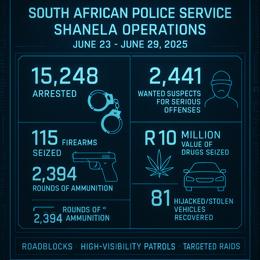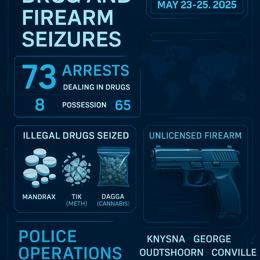Image created by AI
The Hawks and NPA's Inaction: South Africa's Untouched Gold and Tobacco Mafia
The foe of South Africa’s financial well-being isn't merely economic downturns or policy pitfalls but appears also in the form of meticulously structured crime syndicates that wriggle through legal nets. These webs woven of illicit trades in gold and tobacco, nudging South Africa towards global scrutiny and economic repercussions, are yet to see decisive action from the country's law enforcement agencies—the Hawks and National Prosecuting Authority (NPA).
It's been well over two years now, and more than 100 entities and individuals linked to a massive smuggling enterprise—unveiled through painstaking efforts by the SA Revenue Service (SARS), SA Reserve Bank, and Financial Intelligence Centre (FIC)—await justice’s firm grip. A prominent character in this unfolding drama is Zimbabwean tobacco tycoon Simon Rudland, who, along with allies, stands accused of architecting a scandal with tendrils stretching across borders and sectors, touching even the supposed sanctum of the financial institution, Sasfin Bank.
The urgency of this criminal crackdown cannot be overstated. South Africa’s greylist status, as designated by the Financial Action Task Force (FATF), reaffirms the gravity of as-yet-unprosecuted cases like the Rudland saga. FATF's call to action is clear: dismantle the complex counts of money laundering and protect the integrity of global finance.
The narrative, compounded by the allegations against Sasfin Bank's employees in aiding the obfuscation of illegal funds and cross-border monetary misreports, reveals an intricate plot. It is one of offshore accounts and faked invoices, a saga in which gold is smelted and tobacco products become vessels for VAT scams and unregulated riches.
Sasfin Bank’s crisis emerges from these same depths, threatened by a severe SARS damages claim that dwarfs its net worth, piled atop which are substantial fines and a sobering corporate withdrawal from the Johannesburg Stock Exchange (JSE). In contrast, the Hawks’ raids and seizing of assets appear as merely ripples against the scheme's tide.
Despite the interventions and rejigging collaboration strategies among government entities and fiscal authorities, to further reinforce anti-crime commitments, there remains a conspicuous absence of convictions or public reassurance. The FATF's pressure for a “sustained increase in investigations and prosecutions” is a clarion call echoing in the country's courtrooms, corridors of power, and, notably, within the cyber archive of the State Capture Commission, which also threw light on ancillary money laundering operations.
Alarmingly, while South Africa suffers the economic brunt of greylisting, including the shackling of cross-border transactions and inhospitable investment climates, the Hawks and NPA have yet to provide visible resolute actions or explanations for their apparent inertia in this high-stakes case.
Sector-wide, the implications ripple with grim tidings: if a nation's premier guardians of financial propriety can't punctuate their pursuit with satisfactory closures, what does this herald for the integrity and security of an already besieged fiscal fortress?
As the cosmic dust of the SARS, FIC, and Reserve Bank's celestial investigations settles, one question burns bright against the South African night sky: when will the Hawks and NPA cease their spectatorship and swoop down upon the monetary predators lurking within the Republic's realm?










